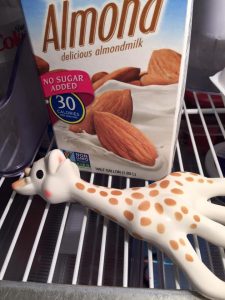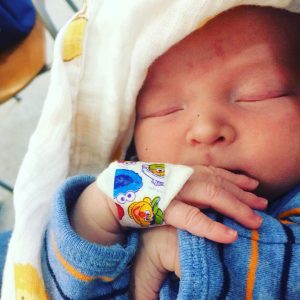I was one of those annoying pregnant women who read and researched every possible path, decision, option, and/or outcome. Truth be told, I’m not really a fly-by-the-seat-of-my-pants kind of gal in everyday life, so throw a baby in the mix and I go into Type-A overdrive. After reading all of the literature and speaking to doctors and other moms, I had every intention of breastfeeding Oliver when he was born. And, in fact, I was successful for nearly four whole days. But, despite what any well-meaning or sanctimommy tells you, breast is NOT always best. There, I said it.
I feel like I should stop here to say, I’ve never been a judgy person when it comes to breastfeeding. I was not (and still am not) one of those women who feels particularly passionate about breast vs. bottle. I have never felt compelled to shame another mother for formula feeding in the same way I’ve never felt the need to shame a mother for breastfeeding in public. I’ve known lots of women who have breastfed and plenty who went solely with formula, and a fair number who settled on something in between. Quite frankly, any minor inkling I’ve ever had to pass judgment on another person is quickly dispensed with when I think about all of the many children around the world who don’t have nearly enough to eat. When I am reminded of that, it doesn’t take long for me to realize that however you got him there, your happy, healthy, well-fed child is none of my business.
But for me and my family, I decided it was what I wanted and I had high hopes for being able to stick with it. It was a personal decision and one I made freely for myself. At the same time, I also openly announced to my husband, family, friends, doctors, and admitted to myself, that if for some reason breastfeeding did not work out, I refused to feel ashamed for having to go a different route.
Many times when I talk to folks about galactosemia and the fact that Oliver lives dairy-free, they are surprised that he was/is unable to breastfeed. They often equate his condition with having an allergy and, since many babies who have a milk allergy or sensitivity often can continue to nurse if mom makes some dietary changes, I’m sometimes met with confusion as to why I didn’t just eliminate dairy from my diet and continue to fight the good fight. I then have to point out to them that, in the case of galactosemia, galactose is present in all mammal-made milk, including breastmilk (yes, humans are mammals, too), so a diet change wouldn’t protect our baby. In essence, my breastmilk was poisoning Oliver and therefore I had to stop.
Despite my laissez-faire attitude on the matter before Oliver arrived, I had a really, really, really tough time accepting the fact that I was not able to meet one of Oliver’s very basic needs in the same way women have been doing since the beginning of time. Maybe it was a biological yearning, maybe it was hormones, but I felt like a complete and utter failure at motherhood and life. Add to that the stress of having a newborn in the hospital fresh off a diagnosis of a rare condition and also having to physically force your body to STOP doing something it is biologically predisposed to…well, let’s just say it was an ugly time emotionally and physically for me.
I lay all this out for you in hopes you can understand then just how disheartening and daunting it can be the first time (and very possibly not the only time) a loved one, a friend, an acquaintance, or even a stranger quotes those three little words to you: Breast is best. It’s hard to know what your reaction might be. If you are like me, you might be inclined to give the person the benefit of the doubt. They mean well. They are just making conversation. They want to make sure you have all the facts. But quite quickly that might be replaced with anger and indignation. How dare someone presume to tell me what is right for my baby? They have no idea what we’ve been through? How can they lack basic empathy for another human being?
And then you will be faced with a choice: (a) become combative; (b) smile and nod; or (c) use the moment as a teaching opportunity to educate someone about why you aren’t breastfeeding. I’d love to say I am one who always is able to rise above and not let it bother me, particularly when I try initially to take the high road and the other person can’t take a hint. But I’m human and sometimes, on a day when maybe I’m struggling or frustrated or in a hurry, the last thing I want is for someone to presume to know what is best for me and my situation. I hate to admit it, but in those moments, I sometimes want to make the other person feel bad. Feel small. I get angry that I’ve allowed this person to make me feel guilty and revisit feelings I had when I felt like such a failure in Ollie’s first days in this world. Just admitting that I could feel that petty makes me feel a real sense of shame. But, in those moments, I have to ask myself: What good will that do, making this person feel small? Will it make me feel better? Will it make this person think twice the next time? Who’s the hero of that story–the presumptuous stranger or the snapping mom? I try to remind myself that I always hope to be the hero of my own story so maybe if I take the high road and try to educate whoever is sharing their advice, I can open that person’s mind to the fact that there is no SINGLE way to raise a baby, to feed a baby, to dress a baby, to diaper a baby, and on and on. Maybe killing ’em with kindness makes more of a lasting impression than lashing out in anger and frustration. I try to remind myself of all of that, and sometimes I may fail, but if I’m lucky, more often than not I will succeed.

 Once the line was in and fluids started, we were finally able to secure a room and the nurse explained what had happened, particularly why it was so important they acted quickly. They worried his hypoglycemia would lead to seizures. That was the immediate fear. Along with the IV fluids, they fed him little packets of a sugar solution. Oliver was placed onto a bili blanket and under a bili light to combat the jaundice caused by the galactosemia (what we had earlier thought was just a typical case of jaundice). The nurse had given him an orange pacifier to help comfort him and had placed little goggles over his eyes. He looked like a little glowing alien. Next, they needed to draw his blood. Lots of blood. His ER doctor wasn’t even sure they could get the amount of blood from him needed for the tests. It took some effort, but they eventually got all that they needed
Once the line was in and fluids started, we were finally able to secure a room and the nurse explained what had happened, particularly why it was so important they acted quickly. They worried his hypoglycemia would lead to seizures. That was the immediate fear. Along with the IV fluids, they fed him little packets of a sugar solution. Oliver was placed onto a bili blanket and under a bili light to combat the jaundice caused by the galactosemia (what we had earlier thought was just a typical case of jaundice). The nurse had given him an orange pacifier to help comfort him and had placed little goggles over his eyes. He looked like a little glowing alien. Next, they needed to draw his blood. Lots of blood. His ER doctor wasn’t even sure they could get the amount of blood from him needed for the tests. It took some effort, but they eventually got all that they needed Even though at the time it felt like an eternity, in hindsight, we were lucky Oliver only needed to stay in the NICU for a few days just long enough to be sure he would tolerate a switch to a soy-based formula, was able to regulate his own blood sugar and potassium once the IV fluids were withdrawn and all of his vitals stayed steady. He bounced back pretty quickly and despite a scary few days, was on his way home one day before his one week birthday. It has and continues to be a long journey, but we grow more confident in our ability to tackle any challenges headed our way with each passing day.
Even though at the time it felt like an eternity, in hindsight, we were lucky Oliver only needed to stay in the NICU for a few days just long enough to be sure he would tolerate a switch to a soy-based formula, was able to regulate his own blood sugar and potassium once the IV fluids were withdrawn and all of his vitals stayed steady. He bounced back pretty quickly and despite a scary few days, was on his way home one day before his one week birthday. It has and continues to be a long journey, but we grow more confident in our ability to tackle any challenges headed our way with each passing day.